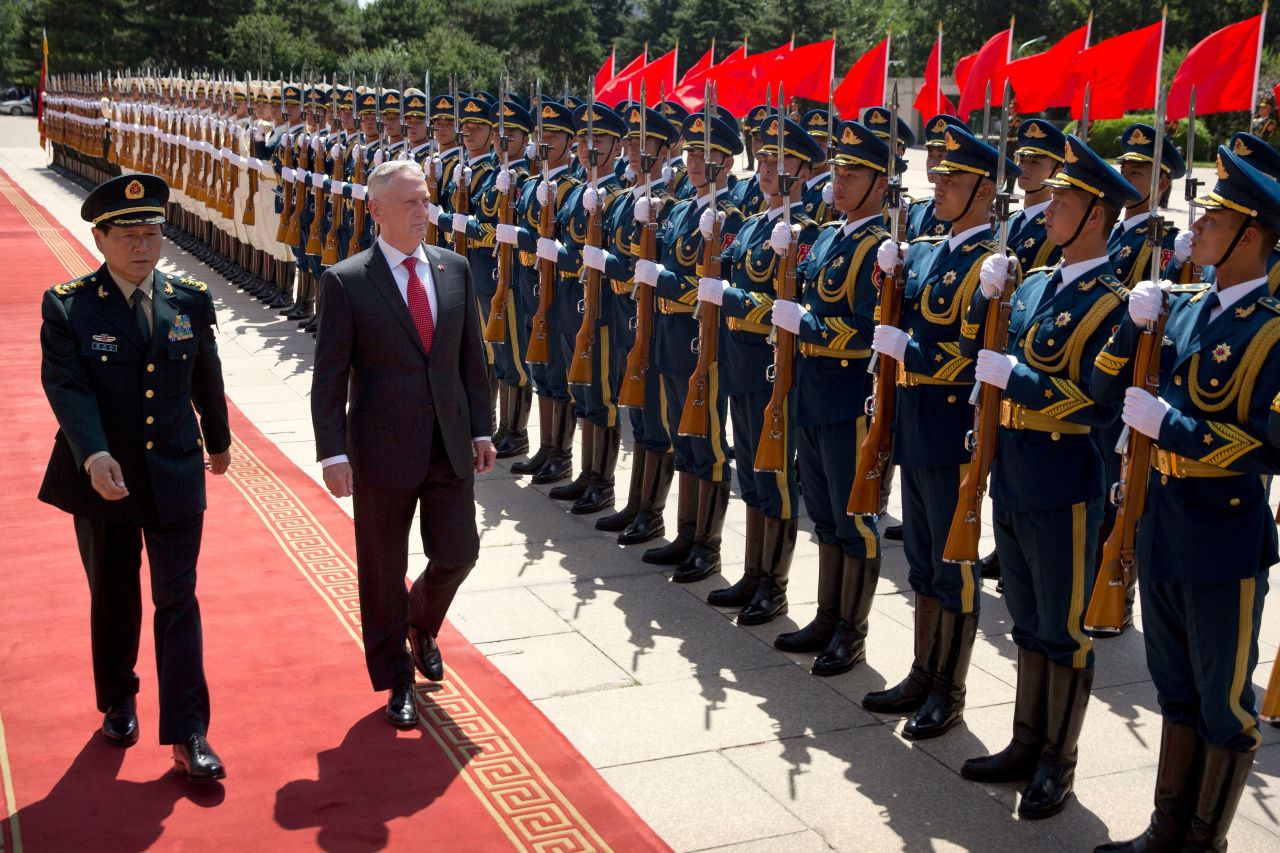
The Wall Street Journal reports: "Security talks between U.S. Secretary of Defense Jim Mattis and his Chinese counterpart have been canceled amid mounting friction between Beijing and Washington. The Pentagon never officially announced a trip to China, but had been working on the possibility that Mr. Mattis would attend talks in Beijing this month known as the diplomatic and security dialogue, U.S. officials said. The U.S.-China diplomatic and security dialogue was held for the first time in June last year in Washington and was supposed to occur annually. The trip is now off, a senior U.S. defense official said late Sunday. China couldn't make Mr. Mattis's counterpart, Gen. Wei Fenghe, available for the planned meeting, souring the Pentagon on the idea, U.S. officials said. The cancellation was first reported by the New York Times. The U.S. embassy in Beijing declined to comment. The U.S. State Department and China's foreign and defense ministries didn't immediately respond to requests for comment. China's foreign minister, Wang Yi, told the U.N. General Assembly on Friday there is 'no cause for panic' over friction between Beijing and Washington, but warned that China wouldn't be blackmailed on trade."
Fortune reports: "With little prospect of a restart for U.S.-China trade talks, JPMorgan Chase & Co. (JPM, +0.49%) now expects an escalation in tensions that will see higher American tariffs on all Chinese imports, sending the yuan sliding to its weakest against the dollar in more than a decade. 'JPMorgan has adopted a new baseline that assumes a U.S.-China endgame involving 25% U.S. tariffs on all Chinese goods in 2019,' JPMorgan strategists including John Normand wrote in a note Friday. While growth forecasts for both the U.S. and China aren't much affected, thanks in part to Chinese stimulus measures, 'a weaker yuan becomes part of the new equilibrium,' they wrote. The People's Bank of China will probably pursue a looser monetary policy to shore up growth in face of the threats to trade, and likely won't intervene much to counter resultant downward pressure on the yuan, according to the JPMorgan analysis."
The New York Times reports: "Well before dawn, nearly a hundred people stood in line outside one of the capital's top hospitals. They were hoping to get an appointment with a specialist, a chance for access to the best health care in the country. Scalpers hawked medical visits for a fee, ignoring repeated crackdowns by the government. A Beijing resident in line was trying to get his father in to see a neurologist. A senior lawmaker from Liaoning, a northeastern province, needed a second opinion on her daughter's blood disorder. Mao Ning, who was helping her friend get an appointment with a dermatologist, arrived at 4 a.m. She was in the middle of the line. 'There's no choice — everyone comes to Beijing,' Ms. Mao, 40, said. 'I think this is an unscientific approach and is not in keeping with our national conditions. We shouldn't have people do this, right? There should be a reasonable system.' The long lines, a standard feature of hospital visits in China, are a symptom of a health care system in crisis."
- 2018-09-28 China, Russia take their turn at the UN
- 2018-09-27 China Rejects Trump’s Charges of Meddling in U.S. Elections
- 2018-09-26 China cancels US warship visit to Hong Kong amid military sanction backlash
- 2018-09-25 China says the U.S. is ‘holding a knife to our neck’ in trade war
- 2018-09-24 Trump’s Tariffs May Hurt, but Quitting China Is Hard to Do
- 2018-09-21 China 'outraged' by US sanctions over Russian weapons buy
- 2018-09-20 Trump Has Put the U.S. and China on the Cusp of a New Cold War
- 2018-09-19 Trump’s trade war still doesn’t scare China
- 2018-09-18 China's military and economic power 'cannot be denied' and US 'has to make room'
- 2018-09-17 China warns it won’t just play defense in a trade war with the US
- The Wall Street Journal Mattis Trip to China Canceled
- Fortune JPMorgan Now Expects Trump to Put Tariffs on Absolutely Everything China Sells to the U.S.
- The New York Times China's Health Care Crisis: Lines Before Dawn, Violence and 'No Trust'
- CNBC Chinese tech has taken hefty blows but giants like Tencent and Baidu are not out for the count
- Financial Times China's 'great wall of capital' set to benefit mutual funds
- CNN Chinese warship in 'unsafe' encounter with US destroyer, amid rising US-China tensions
- CNBC Kudlow: No trade deal with China is 'imminent'
- Business Insider China is developing a new laser satellite meant to hunt down submarines more than 1,600 feet underwater
- Reuters Trump says too soon to talk with China on trade
- CNBC The new NAFTA deal doesn't mean US-China trade relations are about to improve
- Fortune As Trump Boosts Tariffs, China Is Actually Cutting Import Taxes—Again
- The National Interest Where Is America's Outrage over China's Treatment of the Uighurs?
- Politico U.S. tells China: We want competition not cooperation
- The Washington Post China is weaponizing online distraction
- Foreign Policy China's Global Propaganda Is Aimed at Bosses, Not Foreigners
- The National Interest Can the Navy Catch Up To Russia and China's Firepower Advantage?
- The Washington Post Trump is rising to the China challenge in the worst way possible
- The Diplomat Another US-China Dialogue Bites the Dust
- The National Interest Arctic Options: Why America Should Invest in a Future with China
